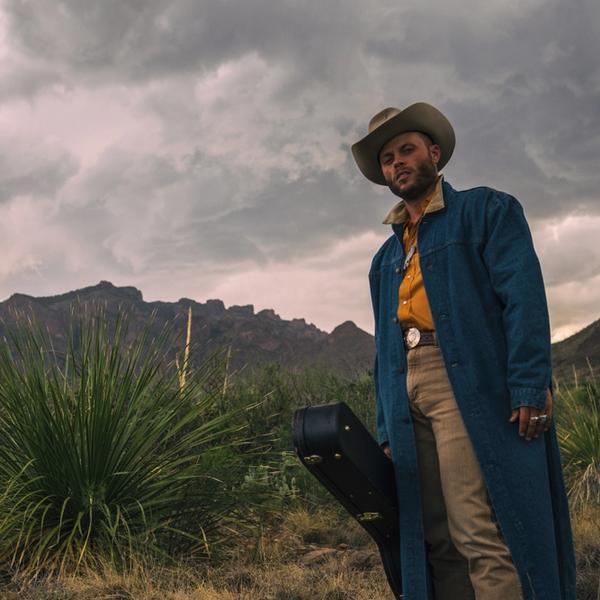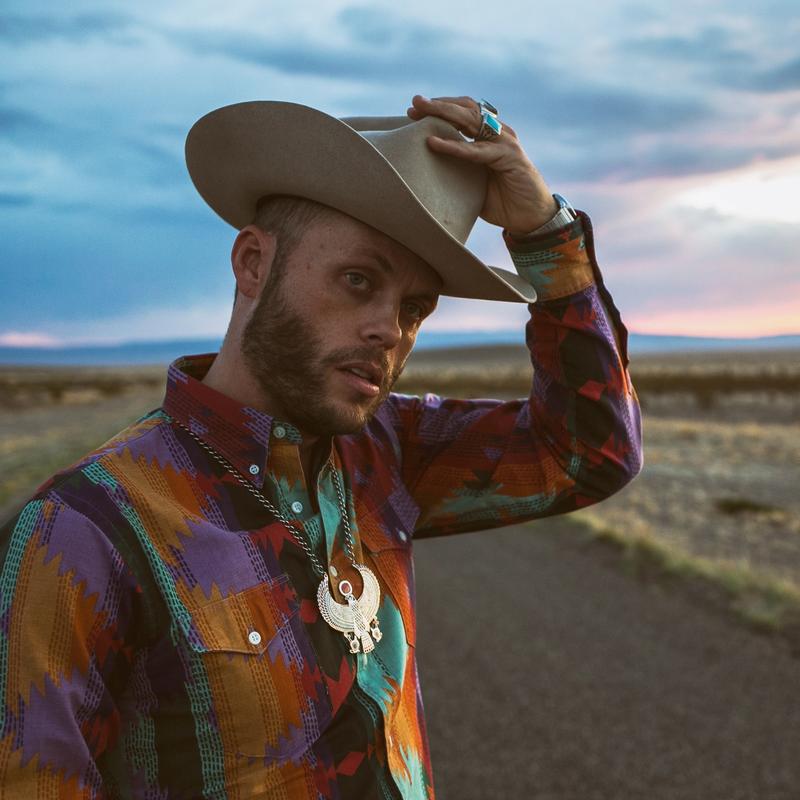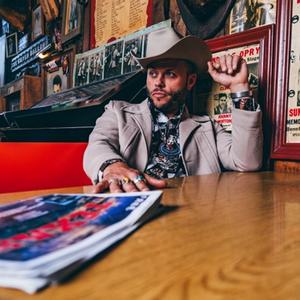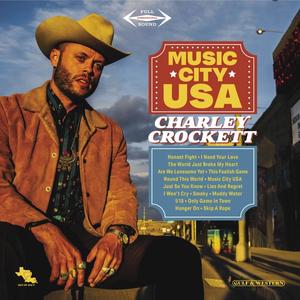




Link copied

A scorecard of 10 albums in six years tells you plenty about Charley Crockett.
Firstly, it tells you just how prolific he is as a songwriter and recording artist - and to a superbly consistent standard. But it also speaks of an undeniable need to do things at his own impressive pace, which just doesn't happen to be the way the major-label machine operates. Yet, in a time that produced many of his heroes, it was.
“I bring this up a lot”, he says when we get on the line from London to Boston, during a tour that continues clean through to the end of the year (New Year's Eve in Lawrence, Kansas, anyone?). “I especially want young people that are thinking about getting into this stuff to recognise that where I'm coming from isn't new. It's actually how everybody did it in the old school days.”
Warming to his theme, he goes on: “By the time Johnny Cash put out the album I Walk The Line in the mid-60s, that was his 19th studio album. [Now] you got artists that won't put out 10 records in a career. So if you want to be somebody like Johnny Cash, and put a dent in country music like he did, you're going to have a hard time doing that in a machine that functions in a way that keeps you from ever really having a chance to develop”.
That sign 'em up, sell 'em quick, spit 'em out mentality is so alien to the native of the Rio Grande Valley in south Texas, he might as well be in a different line of work altogether. Crockett has built his ever-expanding reputation on a mighty catalogue that demonstrates tremendous diversity, newly refreshed on his second album of 2021, Music City USA
“No two alike” is his bold recording promise; as befits a man who has played both the Grand Ole Opry and the Newport Folk Festival. “My viewpoint is: I'm a late bloomer, but now that I've got 10 records out, I want to see where I can go with the next 10 records, with learning how to write songs”, he says.
“Being a street guy, man, I feel like I'm just finding my voice and learning how to really sing. Sometimes I wonder what some of these young people could do if they were to apply themselves into developing that way.”
Music City USA arrived just seven months after his tribute set to another of his great inspirations and fellow Texans, 10 for Slim: Charley Crockett Sings James Hand. This time, as he continues to shape-shift from one disc to the next, it's with a throwback country sound that adds liberal twists of soul, notably on the delectable 'This Foolish Game' and the horn-fuelled 'I Won't Cry.'
He says that another rhythm and blues-flavoured gem, 'I Need Your Love', is “all gulf coast music”, prompting his brilliant description of his sound as Gulf & Western.
Much of the album is so steeped in old-school tradition, you can barely believe these aren't classic covers. Even the retro cover is inspired by a 1960s LP by Waylon Jennings. You can well imagine the likes of 'Honest Fight' or 'Lies and Regret' in the hands of Porter Wagoner or another of Charley's all-time faves, George Jones.
But even with one foot in the past, the net result is a record that sounds fresher than anything by the current mainstream cookie-cutters. And boy, has Crockett lived a life to inform his art.
Born in 1984 in San Benito - a small, largely Hispanic community in Cameron County, Texas - Crockett was raised in a trailer by a single mother, down the road in Los Fresnos. He caught the travel bug early, spending summers with his uncle in New Orleans, largely left to his own devices, teaching himself guitar and getting into soul music just as much as country.
Still a teenager, he began to freestyle, rap and strum for change in the Crescent City and in Dallas, where his mother worked 80-hour weeks and he was a less-than-frequent school attendee.
For the better part of a decade, his real-life was full of the kind of scenes most of us have only seen in movies: jumping freight trains, hitchhiking and sleeping in parks; an artful hobo with charms that would usually earn him a pillow for the night.

Those years were full of adventures that were often more life-threatening than thrilling, such as getting stuck in the Alabama backwoods, being held up at gunpoint, tied up by ganja farmers in California and caught up in the shadowy underworld of Dallas.
Eventually, he gravitated to New York, where his “discovery” was something of a false start. “I signed a deal with a major label [Sony Music] a long time ago”, he tells me. “I was 25 or 26 in New York City, and I got discovered playing in subway cars, between stops, with these groups, on the R train in Manhattan one day.
“I'll never forget the lady I was working with for that short period of time was always saying, 'Your career comes down to The Song, that one song'. And she wasn't wrong, that is how they see it. From their viewpoint, there's a limitless amount of young people that they can put into that model, and when they're done with them, they're on to the next”.
Expanding further on his specialist subject of bucking the system, he continues: “I had a guy come over from England, he was from Sheffield, and he was trying to sign me in Dallas a few years ago. He was drinking whisky pretty hard at a bar there, and he said, 'You know Charley, an artist's average career these days is three records and seven years'.
“It really upset me that he said that”, he goes on. “I left the bar that night thinking about it, and over time, I thought, 'It's kind of brutal, but that's really true'. But if you look back, for every Loretta Lynn, George Jones and Dolly Parton, there were a million artists that came and went. So some of it's always been the same, I guess.”
By the time that deal lapsed, Crockett had slipped away to California to wait out a contract that he had long since seen through. He worked on farms and later resided in various European cities, before his modern-day story began as late as 2015.
He settled back in Dallas (as much as any inveterate travelling performer ever settles) and self-released his first album - the bluesy, rocky, jazzy, gospelly, truly vital A Stolen Jewel - publishing, distributing and marketing it himself.
The Dallas Observer's review drew comparisons with “the scratchy blues of Skip James and the narrative style of Steinbeck”. It described the record, glowingly, as “rich with Southern flavor, a musical gumbo of Delta blues, honky-tonk, gospel and Cajun jazz. It’s the manifestation of a hard-lived life and its earned the attention of many in Dallas.”
One such was Leon Bridges, then the hot new R&B name on the block, whose endorsement opened the doors that led to the Son of Davy label and then the further backing, to this day, of Thirty Tigers.
For three years after A Stolen Jewel, Crockett followed the conventional album-a-year drill, but then his releases began to appear at six-monthly intervals, without the faintest sign of quality losing out to quantity.
He wasn't even slowed down much by open-heart surgery early in 2019, just after the release of Lil G.L.'s Blue Bonanza, to fix a congenital condition in which one of the chambers in his heart wasn’t functioning. Doctors assessed that without the operation he'd have been dead within one year. Instead, he made another four albums in the next two.
By now, it’s clear that if that scare wasn't going to defeat him, a pandemic certainly wouldn't either. “Last year I put out this record called Welcome To Hard Times and we [couldn't] tour it at all”, he says.
“It sold really well, by my standards, but we weren't able to tour it. I bought some billboards and it did really well. I learned a lot realising what a record can do for you. As somebody who's never really had much money going into marketing a record, I learned what can happen with an album if it is promoted well, even if you're not on the road".
“It's like those Beatles records, they kind of ceased being a [live] band, but those records kept growing”, he reflects. “I didn't know that until maybe last year. The guy I've made these last couple of records with, Mark Neill down in south Georgia, he was the one that told me. We were in the middle of making Hard Times and he said, 'Well, looks like the record's going to have to tour itself'. It never occurred to me that somebody could keep growing in visibility and not be on the road”.
Such is his trajectory, Crockett is now part of the American Currents exhibition at Nashville's exalted Country Music Hall of Fame and Museum, where he shares space with Eric Church, the Chicks, Luke Combs, Mickey Guyton and Maren Morris.
He's on a giant billboard – yes, another one – outside the museum with one of his great forebears, and a fellow native of San Benito, Freddy ('Before The Next Teardrop Falls') Fender.
With partial normality now resumed - albeit with some distancing - Crockett is back in his comfort zone. “Any day on the road is a good day, man”, he beams. “People are showing up for the same reason we're showing up, which is they need live music – to hear somebody singing something they can understand, and I need to play it for them. I've been doing this since I was 17 on a street corner. There's no replacement for it”.
---
Photography by Bobby Cochran.
Music City USA is out now via Son of Davy / Thirty Tigers. Listen below:

For more on Charley Crockett, click below:





